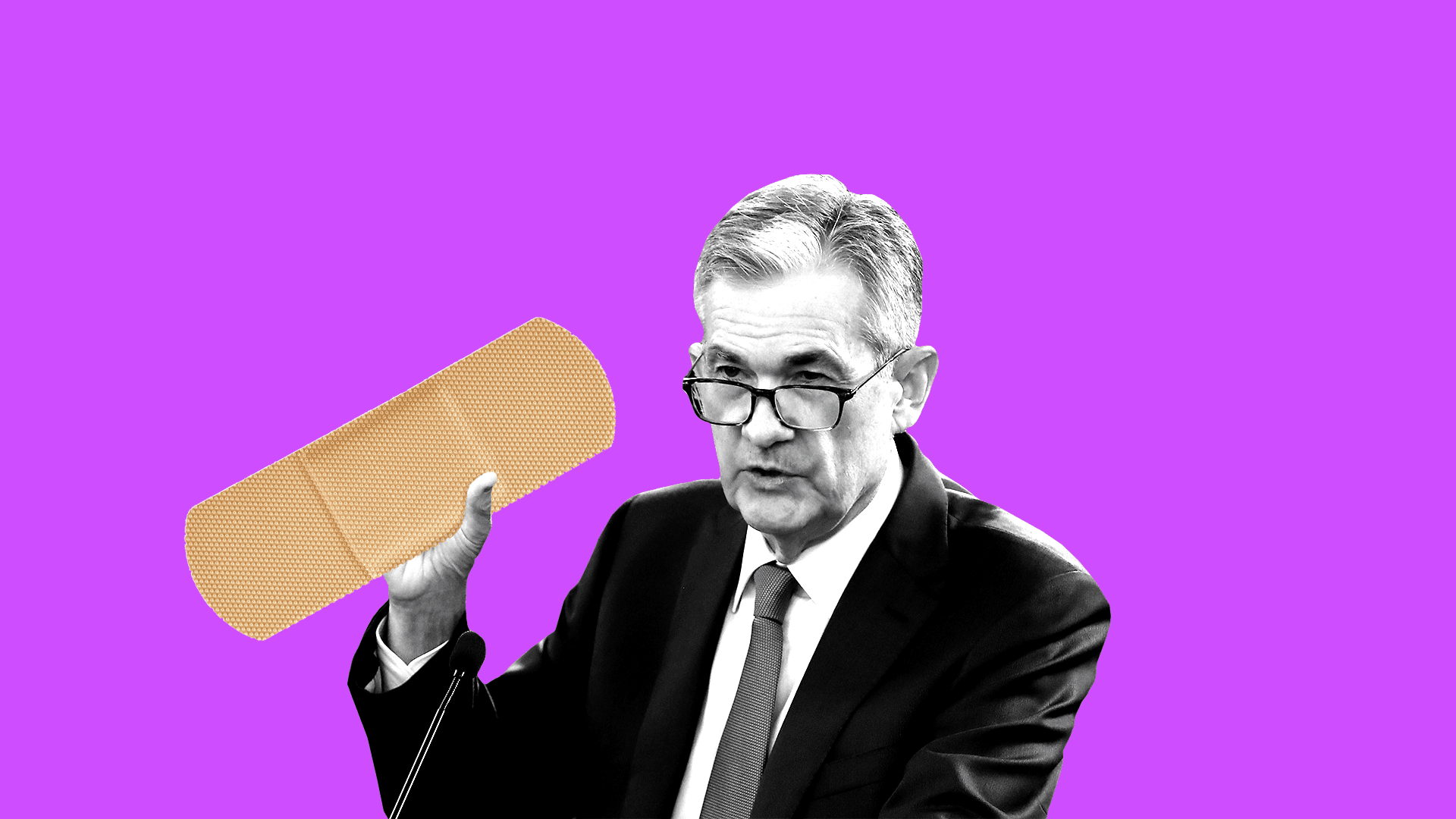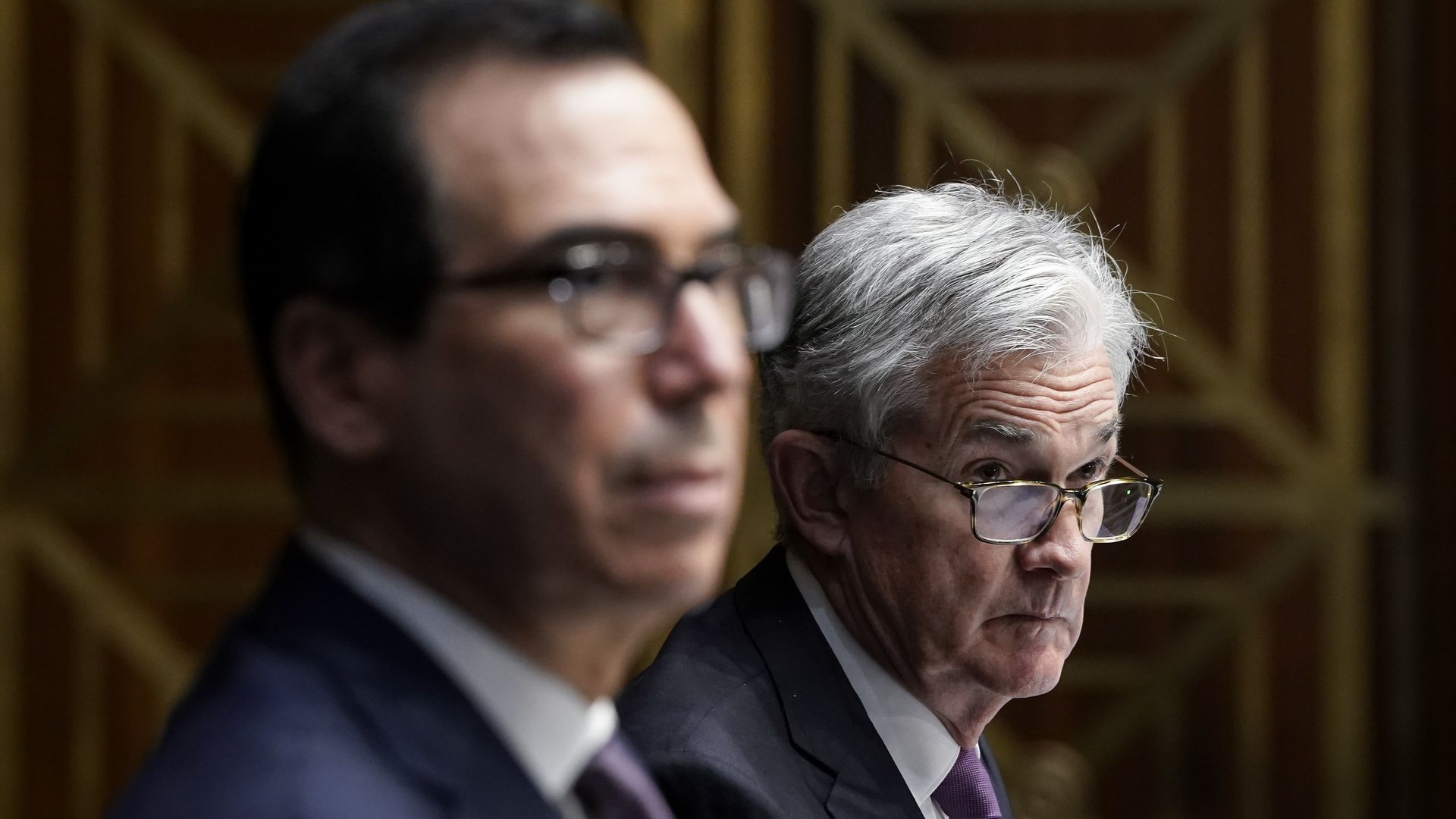| | | | | | | Presented By Raytheon Technologies | | | | Axios Markets | | By Courtenay Brown ·Nov 20, 2020 | | Happy Friday. If this newsletter was forwarded to you, sign up here. (Today's Smart Brevity count: 1,200 words, a 4.5-minute read.) - 🚨 Situational awareness: Pfizer will apply for FDA emergency use authorization for its coronavirus vaccine — setting the stage for possible U.S. distribution by mid-to-late December. (Axios)
🎙️"When you're open to receiving them, the possibilities just keep on coming." - See who said it and why it matters at the end of the newsletter. | | | | | | 1 big thing: Another stimulus fight |  | | | Illustration: Aïda Amer/Axios | | | | A battle over stimulus escalated in Washington last night: Treasury Secretary Steven Mnuchin put emergency lending programs it set up alongside the Fed chair Jerome Powell on the chopping block. Why it matters: The coronavirus pandemic is worse than when these facilities were established in the spring — and economists worry about a resulting steep economic backslide. - If that happens, Treasury's move all but ensures the economy and financial markets are flying solo: Congress hasn't made progress on another aid package — and now the Fed has been hampered in offering support of its own.
What's going on: The Treasury will let a slew of programs — including one that allowed the Fed to buy up corporate debt, and others that issued loans to small businesses and localities — expire at the end of the year. (It will seek to extend a few other programs, that don't require Treasury funds.) - Among Mnuchin's reasons: Banks are well-positioned to lend and financial conditions are healthy. Critical markets, like the municipal or corporate debt market, are functioning smoothly after freezing up when the pandemic hit.
- Worth noting: The Fed programs were a reason markets returned to working order. The Fed simply announced it planned to backstop those markets. That was enough to soothe investors.
The Fed rebuked Mnuchin's move. The central bank, which almost never issues public statements, said it would "prefer that the full suite of emergency facilities established during the coronavirus pandemic continue to serve their important role as a backstop for our still-strained and vulnerable economy." - The Fed can't act on its own to make drastic changes to the emergency loan programs — it needs Treasury's signoff. Extending the programs is considered such a change.
Mnuchin also ordered the Fed to return the unused funds, so Congress can reallocate the money elsewhere. - One big concern: This could delay the incoming Biden administration from restarting or green lighting fresh Fed programs. Replenishing these funds would require an act from Congress.
What they're saying: Mnuchin told Bloomberg late Thursday that businesses need grants — which Congress has the power to dole out — not the loans that a sunsetting Fed program issued. - That Fed program, which funds loans to small and midsized businesses, has seen limited demand. So has another meant to lend to cash-strapped localities.
- Yes, but: The "facilities didn't see large take-up in the past, & they might not be used much more in 2021, but getting rid of them now is adding on even more risk," Ernie Tedeschi, a policy economist at Evercore and former economist at the Treasury Department, said on Twitter.
Between the lines: The programs' initial September expiration was pushed off earlier this year. - There was some expectation that these programs would roll over into next year. The economy is still fragile, against a backdrop of skyrocketing coronavirus cases. The economy could quickly deteriorate, making these expiring programs all the more necessary.
There are questions about what the Fed can do next. - Bharat Ramamurti, a watchdog for CARES Act funds, tweeted the Fed can reject Mnuchin's request — then keep making loans with funds Treasury has already committed.
|     | | | | | | Bonus content: The act to hobble the Fed |  | | | (Photo by Drew Angerer/Getty Images) | | | | Axios' Felix Salmon writes: Treasury Secretary Steven Mnuchin was one of the heroes of the coronavirus crisis, working hand in glove with Fed chair Jay Powell to give the central bank all the ammunition it needed to fight the virus and the associated economic recession. - Now, by trying to take that ammunition away, he risks being painted as one of the great villains of the Trump administration.
The big picture: In a crisis, the distinction between fiscal policy (Treasury) and monetary policy (the Fed) tends to blur. - A lot of the Fed programs announced this spring were possible only because they were approved by the Treasury, which promised to cover any costs in the event that they ended up losing money.
The bottom line: The crisis has seen Powell rise to the occasion in a very impressive manner. But he couldn't have done it without Mnuchin. Now, it seems, Mnuchin is trying to ensure that Powell won't have the same powers under Biden. Read Felix's story. |     | | | | | | 2. Catch up quick | | Tween/teen gaming platform Roblox filed to go public. (Axios) The UK will review IPO rules, in an effort to make post-Brexit Britain more appealing for tech companies to go public there. (PitchBook) BuzzFeed is buying HuffPost in an all-stock deal. Verizon Media, HuffPost's owner, will take a minority stake in BuzzFeed. (Axios) |     | | | | | | A message from Raytheon Technologies | | The future of aerospace and defense is here | | |  | | | | At Raytheon Technologies, nearly 200,000 engineers, scientists and researchers are pushing the limits of known science to explore deep space, advance aviation and build smarter defense systems that protect all of us here at home. That's the future of aerospace and defense. Learn more at RTX.com | | | | | | 3. Unemployment filings in two charts |  Data: U.S. Department of Labor, FRED; Chart: Naema Ahmed/Axios New unemployment filings — a loose indicator of firings across the country — seem to have leveled off at a devastatingly high point: around 1 million new weekly applications per week. Why it matters: Filings have come way down from their peak when COVID-19 first hit. But now that downward pressure has stalled. What they're saying: "We saw fairly steady, substantial improvement in initial claims (regular state benefits + PUA) through the week ending October 3, but since then the improvement has really slowed," Heidi Shierholz, a senior economist at the Economic Policy Institute, tells Axios in an email. - "That is part and parcel of the labor market improvement that we had been seeing in the summer slowing as stimulus fades and as the virus surges, disrupting the economy and the labor market."
 Source: Department of Labor; Chart: Axios Visuals Continued claims — or people who keep receiving unemployment benefits after initially applying — are steadily shrinking. - Part of that may be people rolling off unemployment and returning to work. But it's also the case that a large swath of Americans have been booted from the program because they've been unemployed so long, they have run down their benefits.
- They are instead applying to receive benefits through the Pandemic Emergency Unemployment Compensation (PEUC) program, which offers an additional 13 weeks of support. This program swelled by over 233,000 people in the week ending Oct. 31.
- The Extended Benefits program, available in most states for eligible unemployed workers that have exhausted regular state and PEUC benefits, saw a slight uptick last week.
|     | | | | | | 4. Next steps in Bank of America's $1B pledge to fight inequality | | Earlier this year, Bank of America committed to spending $1 billion over four years to address racial and income inequality in America, as a reckoning over systemic racism and police brutality took hold of the country. - The bank said in September it would set aside $25 million of that initial sum for jobs initiatives in Black and Hispanic/Latino communities.
Now we know how that $25 million will be distributed. - Driving the news: The bank is giving $1 million to each of 21 colleges and universities with large populations of Black and Latino students: HBCU Morgan State University, St. Louis Community College and the University of Puerto Rico's Río Piedras campus — to name a few.
- The universities will use the money to create (or expand) job training programs.
- Bank of America says it will work with local employers to match the training with potential jobs.
That leaves $4 million, which will go to partners to help carry out the program over the next four years, per a spokesperson. - $1 million will go to the Aspen Institute, which is in turn collaborating with the National Center for Inquiry and Improvement, to help with "technical and programmatic assistance."
- The other $3 million is being put aside for other potential partners.
Why it matters: The backlash against the police killings of George Floyd, Breonna Taylor and others pushed corporate America to commit billions of dollars to causes that combat racial inequality — more money than ever before. |     | | | | | | A message from Raytheon Technologies | | The future of aerospace and defense is here | | |  | | | | At Raytheon Technologies, nearly 200,000 engineers, scientists and researchers are pushing the limits of known science to explore deep space, advance aviation and build smarter defense systems that protect all of us here at home. That's the future of aerospace and defense. Learn more at RTX.com | | | | 📧 Reply with any tips, questions or gripes. See you back here on Monday. Quote: "When you're open to receiving them, the possibilities just keep on coming." Who said it: Oprah Winfrey, who announced on Nov. 20, 2009, that her daily talk show would soon end — after 25 years on the air. | | | | Axios thanks our partners for supporting our newsletters.
Sponsorship has no influence on editorial content. Axios, 3100 Clarendon Blvd, Suite 1300, Arlington VA 22201 | | | You received this email because you signed up for newsletters from Axios.
Change your preferences or unsubscribe here. | | | Was this email forwarded to you?
Sign up now to get Axios in your inbox. | | | | Follow Axios on social media:    | | | | | |
No comments:
Post a Comment